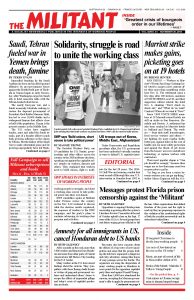SAN DIEGO — Workers at Marriott’s Westin San Diego Gaslamp hotel voted to accept a new contract after their more than monthlong strike here Nov. 11. The settlement came a few days after 100 strikers, members of UNITE HERE Local 30, and their supporters rallied outside the hotel Nov. 6, chanting “Don’t check in, check out,” and “What do we want? Contract! When do we want it? Now!”
Some 7,000 UNITE HERE members at 19 Marriott-owned hotels are still on strike in San Francisco, Honolulu and Boston. A settlement has also been reached at Marriott hotels in Oakland and Detroit. The workers — front desk staff, housekeepers, food service workers and others — are fighting for more regular shifts, better pay, against hikes in the cost of health care, for more safety protection and against the threat of job losses from the bosses’ moves to install new technology or replace workers with contractors.
Their most popular slogan is “One job should be enough,” because their wages are so low that many need two or more jobs to get by.
“As long as you have a union between workers you can get anything,” striker Marco Espinoza told the Militant at the rally. He started work at the hotel shortly after the union won an organizing drive there five years ago.
Sheraton Hotel worker Jonathan Locke joined the picket line after work. He said that the strike has strengthened the effort to get a union at his hotel and that 50 co-workers have come over to the picket line. “Workers at the Sheraton did a collection for us and raised $800,” striker Paul Castro said.
In addition to wages and safety, the strikers biggest concerns are efforts by the hotel bosses to cut jobs and increase the workload of workers who would remain. One issue is a trend in the industry toward offering guests rewards if they register under so-called “green” programs, where they agree not to have their rooms cleaned. This means less work for the housekeepers, and more and harder work when guests leave after days of no cleaning.
Another threat is technology replacing workers. This involves computer kiosks for check-in, checkout and paying restaurant bills that replace front desk and cashier jobs; apps like Seamless to order food, replacing cooks, servers and concierges; and doormen losing tips because guests use Uber and Lyft apps instead of hailing cabs.
Some Marriott hotel bosses have arranged with Amazon to install Echo devices in every room. “Alexa might do my job in the future,” Maria Mendiola, a concierge who had been on strike at the San Jose Marriott, told the New York Times.
All these technologies help hotel bosses cut costs, David Autor, an MIT professor, told the Times. In addition to wages, which cost bosses money, workers get sick and take vacations. “People are messy,” he said. “Machines are straightforward.”
“I’m not against technology,” said 32-year-old doorman Juan Eusebio, a striker at the W Hotel in Boston. “I just want any technology that comes in to help us do a better job, not take our jobs away.”
The walkout is having an effect. Guests tell strikers that conditions are bad. Some have filed lawsuits against the hotel bosses, saying they were charged full price but got sharply limited services.
Mike Godfrey from British Columbia, Canada, told the Maui News that things at the Sheraton Maui Resort & Spa were rough, but “I support the strikers 100 percent.”
This strike opened my eyes,” Roblyn Kastrinakis, who works in the pantry at the Moana Surfrider Hotel in Hawaii, said Nov. 13 on the UNITE HERE Local 5 website. “We must understand what we are worth.”
“We have changed because of this struggle,” she said.

